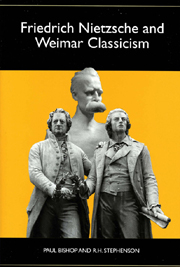Book contents
- Frontmatter
- Contents
- Dedication
- Acknowledgments
- A Note on Editions, Abbreviations, and Translations
- Introduction
- 1 Die Geburt der Tragödie and Weimar Classicism
- 2 The Formative Influence of Weimar Classicism in the Genesis of Zarathustra
- 3 The Aesthetic Gospel of Nietzsche's Zarathustra
- 4 From Leucippus to Cassirer: Toward a Genealogy of “Sincere Semblance”
- Appendix: The Composition of Zarathustra
- Bibliography
- Index
Appendix: The Composition of Zarathustra
Published online by Cambridge University Press: 05 February 2013
- Frontmatter
- Contents
- Dedication
- Acknowledgments
- A Note on Editions, Abbreviations, and Translations
- Introduction
- 1 Die Geburt der Tragödie and Weimar Classicism
- 2 The Formative Influence of Weimar Classicism in the Genesis of Zarathustra
- 3 The Aesthetic Gospel of Nietzsche's Zarathustra
- 4 From Leucippus to Cassirer: Toward a Genealogy of “Sincere Semblance”
- Appendix: The Composition of Zarathustra
- Bibliography
- Index
Summary
IF THE FIRST OF THE TWO KEY CONCEPTS that dominate Nietzsche's account in Ecce Homo of the composition of Zarathustra is the idea of the eternal recurrence (see chapter 2), the second is “inspiration” (EH Z §3; KSA 6:339). In his pseudo-autobiography, Nietzsche offered the following description of the kind of inspiration he had in mind:
— Hat Jemand, Ende des neunzehnten Jahrhunderts, einen deutlichen Begriff davon, was Dichter starker Zeitalter Inspiration nannten? Im andren Falle will ich's beschreiben. — Mit dem geringsten Rest von Aberglauben in sich würde man in der That die Vorstellung, bloss Incarnation, bloss Mundstück, bloss medium übermächtiger Gewalten zu sein, kaum abzuweisen wissen. Der Begriff Offenbarung, in dem Sinn, dass plötzlich, mit unsäglicher Sicherheit und Feinheit, Etwas sichtbar, hörbar wird, Etwas, das Einen im Tiefsten erschüttert und umwirft, beschreibt einfach den Thatbestand. Man hört, man sucht nicht; man nimmt, man fragt nicht, wer da giebt; wie ein Blitz leuchtet ein Gedanke auf, mit Nothwendigkeit, in der Form ohne Zögern, — ich habe nie eine Wahl gehabt.
(EH Z §3; KSA 6:339)- Type
- Chapter
- Information
- Friedrich Nietzsche and Weimar Classicism , pp. 197 - 242Publisher: Boydell & BrewerPrint publication year: 2004

